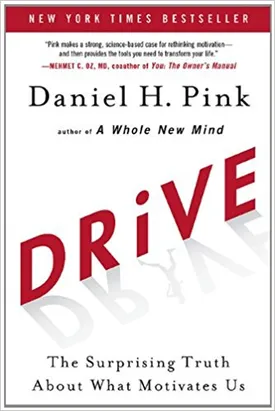Drive: The Surprising Truth About What Motivates Us by Daniel Pink
Drive: The Surprising Truth About What Motivates Us by Daniel Pink delves into what really drives us to complete tasks and reach our goals. Drawing on modern research from the fields of psychology, biology, and economics, Pink explains why the traditional methods of rewarding performance with monetary incentives are not effective motivators and instead presents his case for Autonomy, Mastery, and Purpose (AMP) as the true motivators of human behavior for long-term success.
Pink begins with a broad history of motivation theory, illustrating how the traditional ways of motivating with rewards such as money and other incentives were developed in pre-industrial centuries, while modern theories of motivation are more recent in origin. He then expands on the notion of motivators, noting how traditional models of rewards fail to take into account important factors such as autonomy, mastery, and purpose.
One of the most important aspects of motivating individuals is autonomy. Pink explains how autonomy is essential for someone to be motivated to complete a given task. Autonomy is defined as being self-directed, allowing a person to make decisions on their own free will. In a modern work environment, autonomy means giving employees the freedom to work the way they choose and to select the tasks or mini-responsibilities that best fit their skills and interests.
The second factor highlighted by Pink is mastery, or the ability to learn and improve over time. Pink's research has shown that satisfaction comes from striving to improve one's skills and abilities, rather than merely earning rewards for work completed. He notes that for a person to remain motivated through mastery, they need to feel as though they are continually gaining ground, no matter how small. This means that employers need to provide feedback that is more meaningful and encourages improvement without relying on earnings-based rewards.
Finally, the third of Pink's AMP factors is purpose, which he defines as the belief that one's work has relevance to the greater good. He cites research that shows how those who are motivated by purpose tend to be more productive and engaged, as well as being more successful in the long-term. Pink encourages employers to rethink their approach to motivation and to focus less on monetary rewards and more on meaningful incentives such as recognition and a sense of purpose.
Drive: The Surprising Truth About What Motivates Us by Daniel Pink offers an in-depth exploration of motivation theory, showing how traditional reward-based models of motivation are no longer effective and introducing the concepts of autonomy, mastery, and purpose. Pink's research reveals the importance of creating both meaningful individual goals and larger, purpose driven objectives for all employees. By understanding the value of autonomy, mastery, and purpose in motivation, employers can create a work culture that allows individuals to reach their maximum potential for long-term success.

